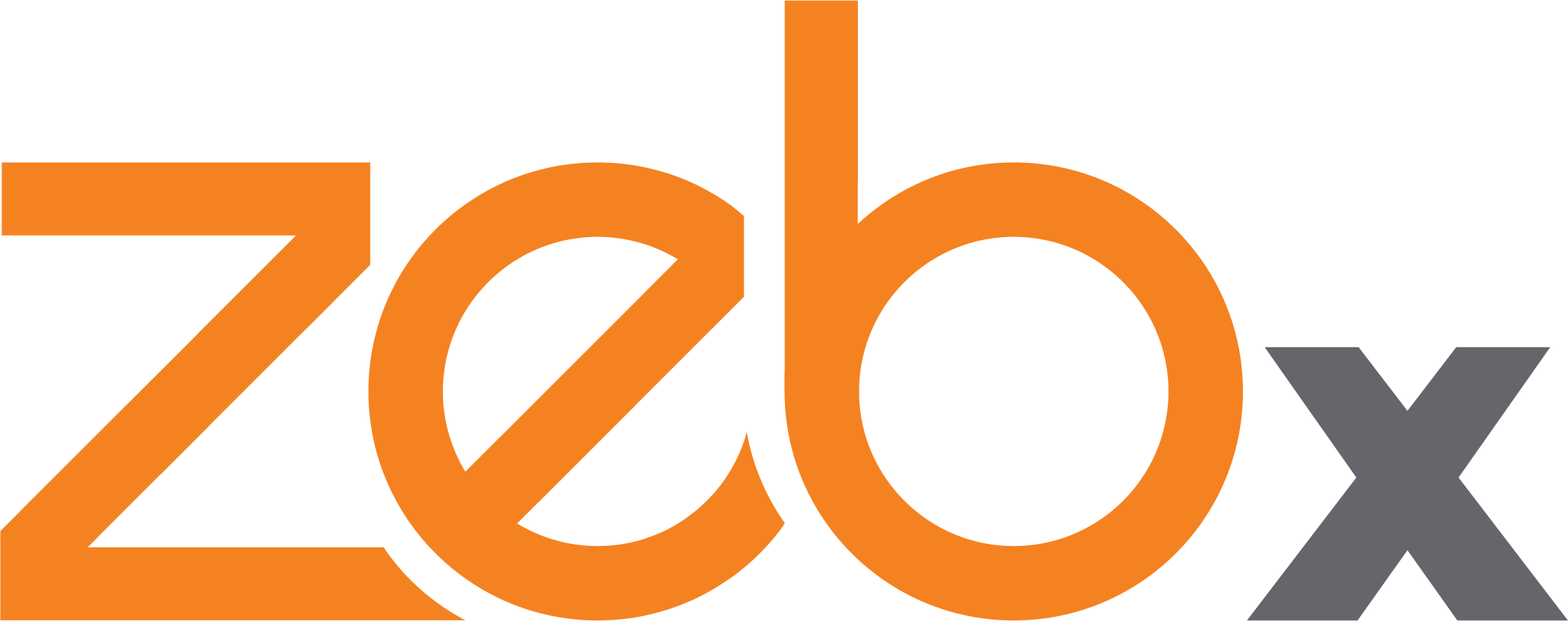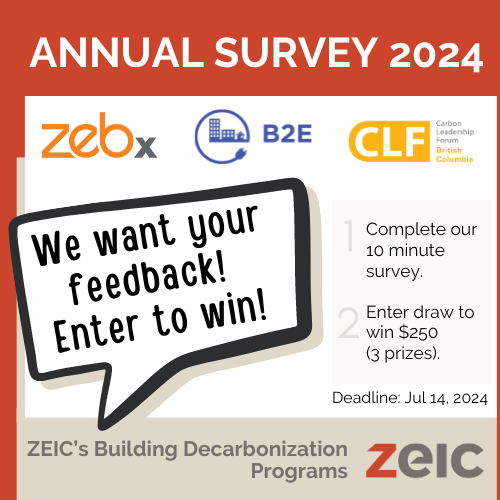
Mar 2023 Decarb Lunch Podcast: Step 4, All-Electric and Massive
April 4, 2023
The Road to Step 5
April 5, 2023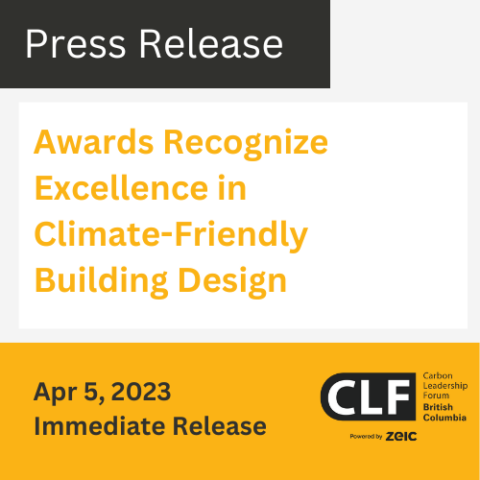
Awards Recognize Excellence in Climate-Friendly Building Design
Press Release / Apr 5, 2023 – For Immediate Release
COAST SALISH TERRITORIES I VANCOUVER, BC – This past week British Columbia’s zero-carbon buildings community recognized a group of properties that demonstrated leadership in producing minimal carbon pollution from their component materials, and during their construction.
The inaugural BC Embodied Carbon Awards, hosted by the Carbon Leadership Forum British Columbia (CLF British Columbia) took place on Mar 30, 2023. CLF British Columbia, a program area of the Zero Emissions Building Exchange (ZEBx) and part of the Metro Vancouver Zero Emissions Innovation Centre (ZEIC), is BC’s centre of excellence in low carbon building design.
While most conversations on building emissions largely focus on the pollution they produce during their operation, embodied carbon is that which is generated during the production and transport of their component materials, such as steel and concrete, and those associated with their construction and eventual disposal.
According to an August 2022 study by Priopta, a company that studies the full climate impact of buildings, in British Columbia this embodied carbon represents up to 46% of a given property’s overall footprint. Priopta conducted the study for the Province of British Columbia.
In 2019, the City of Vancouver set a goal to reduce embodied carbon in new buildings 40% by 2030, compared to 2018 levels. Starting in July 2023, the city will begin requiring developers to calculate and report embodied carbon in all their new projects.
A capacity crowd, in excess of 100, packed into the events lounge of Steamworks Brewpub, Water Street, Vancouver. The awards were introduced Dr Peter Robinson, Chair, Metro Vancouver ZEIC, alongside City of Vancouver Councillor Adriane Carr, also a ZEIC board member.
The awards were presented by MLA: Hon. George Heyman, Minister of Environment and Climate Change Strategy (Vancouver – Fairview) and Caroline Butchart, CLF British Columbia Program Manager, ZEBx.
Celebrating the leaders who are achieving embodied carbon reduction in building projects across the province acts as an inspiration, example and catalyst to others, showing how it is possible to minimize carbon footprints and meet our 2030 and 2050 commitments.
Over 25 organizations sent in entries, with the awards split into five categories, each with buildings located in Vancouver and in the wider province. Small and large projects were recognized, as well as those organizations and municipalities currently excelling in committing to make the change in reducing embodied emissions.
Winners
Small Buildings – Vancouver
Third Space Commons, Third Quadrant Design
This project at UBC’s campus with input from a student design team, is a first, using an existing single-family home which will be deconstructed and reuse materials and systems from the original building.
Small Buildings – BC
Inlet View, Carbon Wise
This is a single home where the client when beyond regular construction standards. The design team reduced whole life carbon, prioritising both embodied carbon and operational carbon reduction and achieving step code five.
Large Buildings – Vancouver
365 Railway, Perkins&Will
This is a mass timber addition of four storeys to an existing two-storey concrete building originally built in 1949. This adaptive re-use of a building is a case study in how we can add value to our existing building stock, and prevent the endless demolition, new-build cycle.
Large Buildings – BC
Discover Montessori, Checkwitch Poiron Architects Inc
This is a project to build a school located in Nanaimo, BC. The building carefully considered alternative construction methods to swap out the most carbon intensive forms of construction, for exceptionally low embodied carbon, with an impressive reduction of 42% relative to their baseline.
The ‘Commitment to Change’ awards recognized that embodied carbon reduction strategies are not possible on all projects, but many BC organizations are making significant efforts across multiple projects or enabling others to do so.
Commitment to Change – Public, not for profit organizations
City of Nelson
This local municipality placed embodied carbon central to the work that they do. They have led the way for other, larger municipalities, by commissioning a benchmarking report and by offering low carbon home consultations to builders and designers.
Commitment to Change – Private Organizations
EllisDon
In addition to assessed their full scope of emissions, EllisDon have come up with a targeted action plan for reducing them. They have also signed onto the Science Based Targets initiative, committing themselves to set verifiable standards in 2023 that pledge to reduce emissions consistent with limiting global warming to 1.5°C.
Quotes
MLA: Hon. George Heyman, Minister of Environment and Climate Change Strategy (Vancouver – Fairview) said:
“There are so many innovative technologies, ideas and work here in British Columbia creating a leadership path to the low carbon future we want. It can be challenging for policy-makers to convince practitioners to adopt to low carbon technologies and techniques when they are unfamiliar with them. We need to showcase these successes to demonstrate they can be implemented with positive results, and the BC Embodied Carbon Awards celebrates both these projects and the people involved.”
City of Vancouver Councillor Adriane Carr said:
“Vancouver is the first city in North America to introduce whole-building embodied carbon requirements as part of our climate emergency goal of a 40% embodied carbon reduction by 2030. Our success relies on innovation from the building industry, along with technologies to reduce embodied emissions throughout the sector. The people in this room are at the leading edge of adopting and accelerating this work and show we have strong local capacity to achieve our goals.”
Dr Peter Robinson, Chair, Metro Vancouver ZEIC said:
“This is the first time we’ve had these awards. It’s an important way to celebrate those who are helping to accelerate the effort to reduce embodied emissions in the BC building sector. This awards program is also a demonstration of leadership and climate actions that are much needed and achievable today as we work towards 2030 emissions reduction targets.”
Caroline Butchart, CLF British Columbia Program Manager, ZEBx said:
“These winners are proving that our climate goals are achievable when we put our minds to it, and when the environment and collaboration is placed as a central value to the project. I would encourage anyone who thinks that reducing our carbon footprint is too expensive, or not possible for their project, to take a look at these projects for inspiration. They hold a lot of the answers we’re looking for..”
Background
CLF British Columbia, formerly know as CLF Vancouver (until Mar 30, 2023), is a local hub of the Carbon Leadership Forum, established in 2019. CLF British Columbia has been a role model for other CLF regional hubs across the world and has played a key role in the City of Vancouver’s efforts to significantly reduce embodied carbon for new buildings by 2030.
CLF British Columbia is a program speciality area of the Zero Emissions Building Exchange (ZEBx), part of the Metro Vancouver Zero Emissions Innovation Centre (ZEIC). This program is sponsored by the City of Vancouver and the Forestry Innovation Investment.
The Awards were sponsored by Carbon Wise Sustainable Innovation, Perkins&Will, Third Space Properties Inc and Reload Sustainable Design Inc.
Additional Insights
Today in British Columbia, emissions from building operations account for 13% of BC’s overall emissions, largely from the use of fossil fuel-based heating and hot water and other building systems. At 11%, embodied greenhouse gas emissions in the building sector today rival operational emissions and are an important source to be reduced to address climate change. Embodied emissions are associated with the fabrication and transportation of building materials, construction and emissions associated with equipment and materials renewal, deconstruction and disposal over the lifetime of a building.
Contact
Photographs
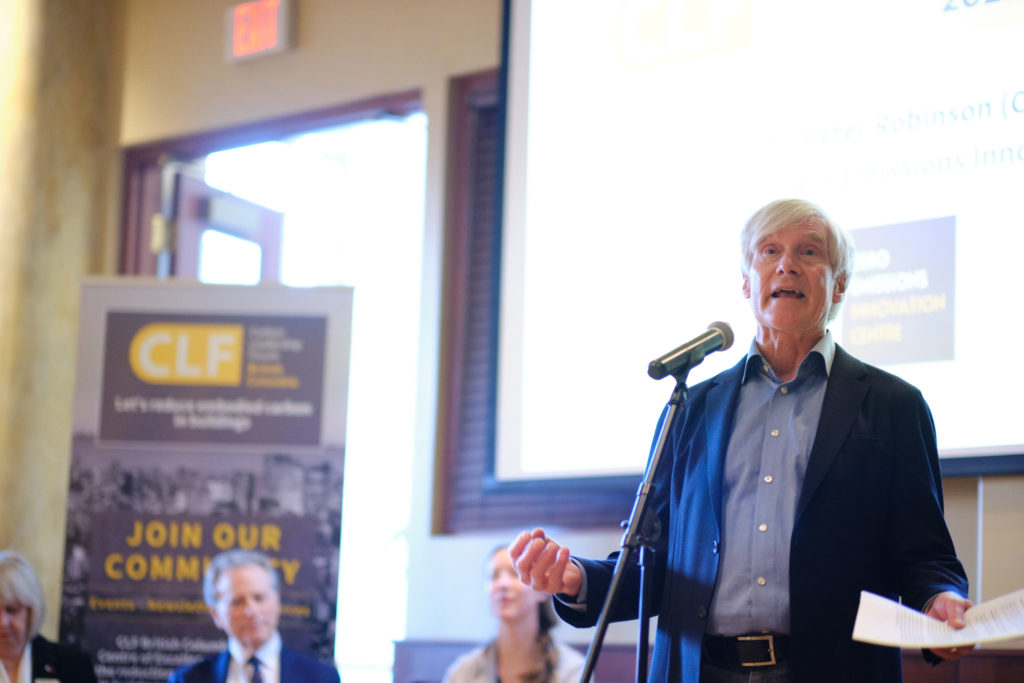
Dr Peter Robinson, Chair, Metro Vancouver ZEIC introduces the BC Embodied Carbon Awards 2023. Photo Credit: Michael Lee www.michaelseanlee.com
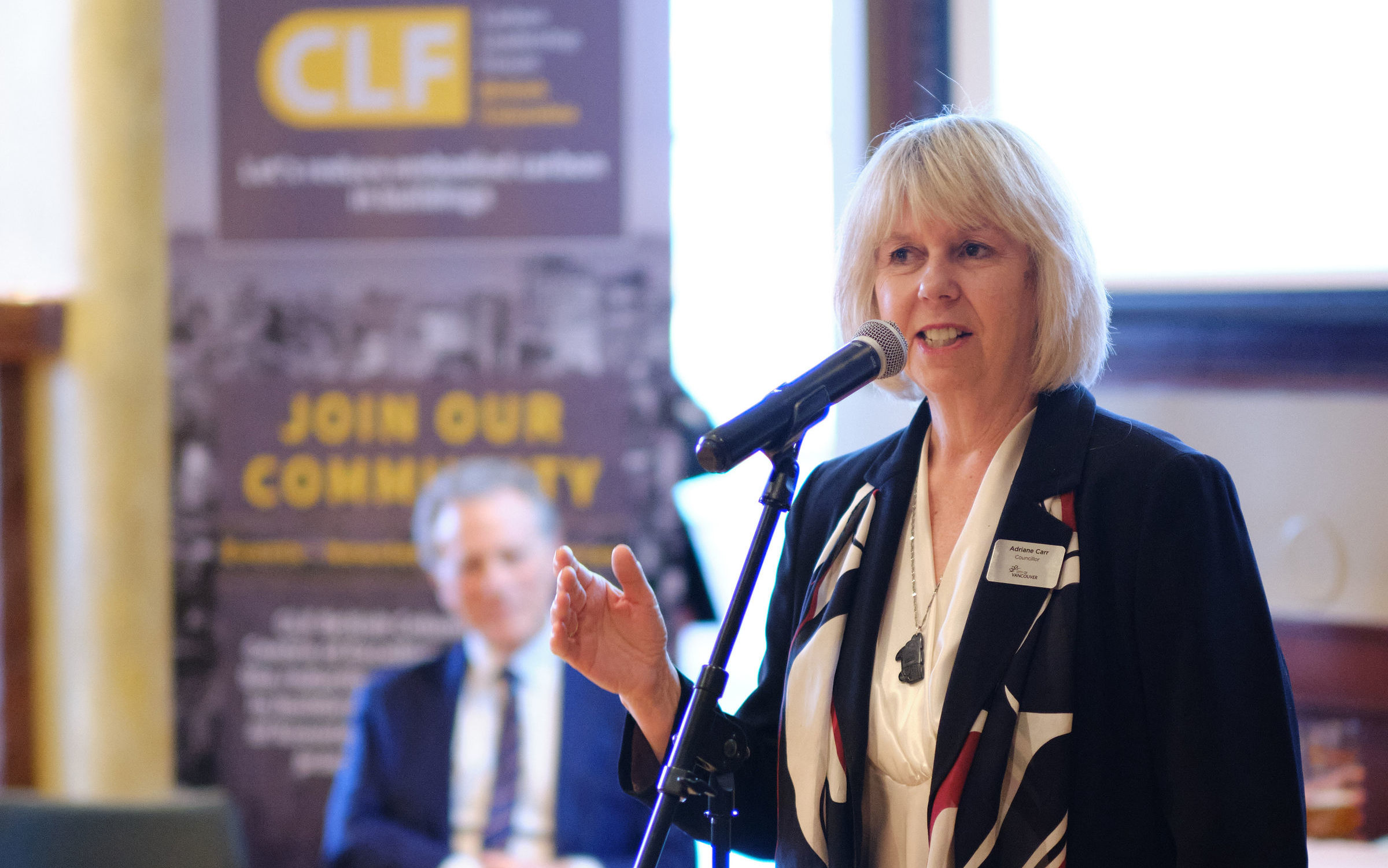
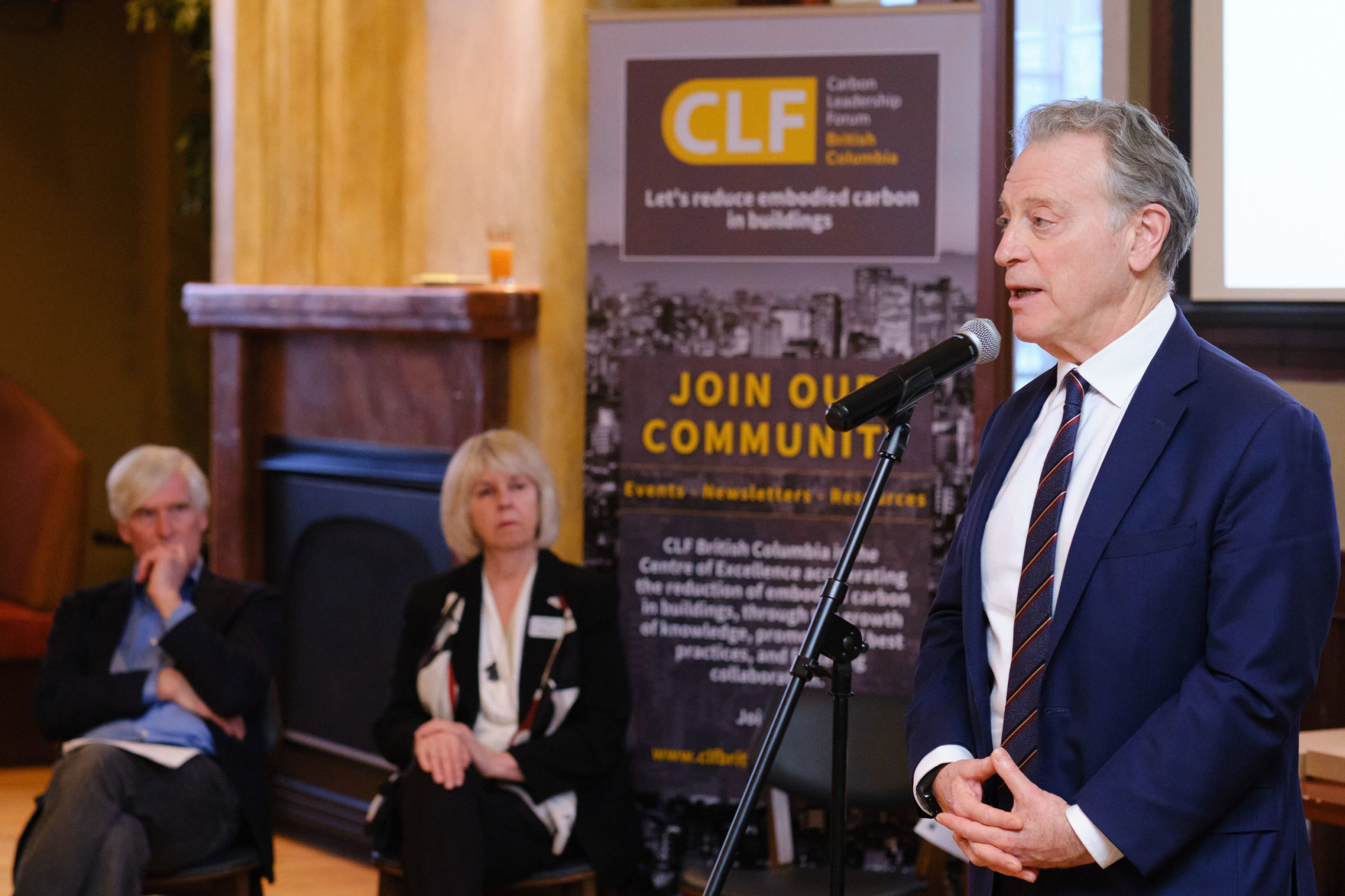
MLA: Hon. George Heyman, Minister of Environment and Climate Change Strategy (Vancouver – Fairview) announces the award winners, with (L to R) Dr Peter Robinson, Chair, Metro Vancouver ZEIC, alongside City of Vancouver Councillor Adriane Carr. Photo Credit: Michael Lee www.michaelseanlee.com
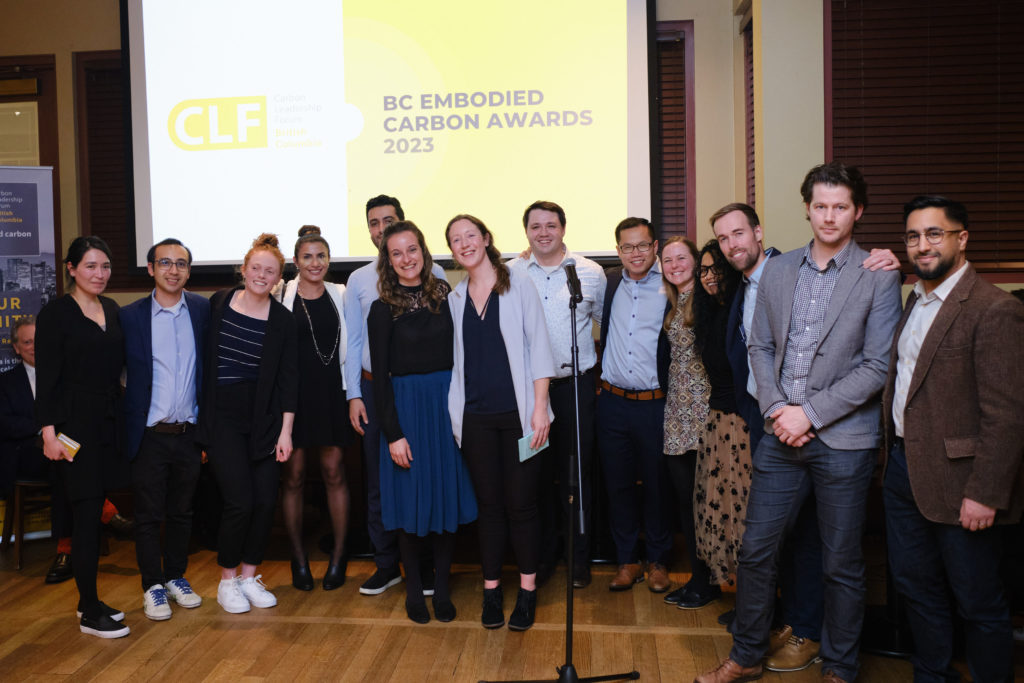
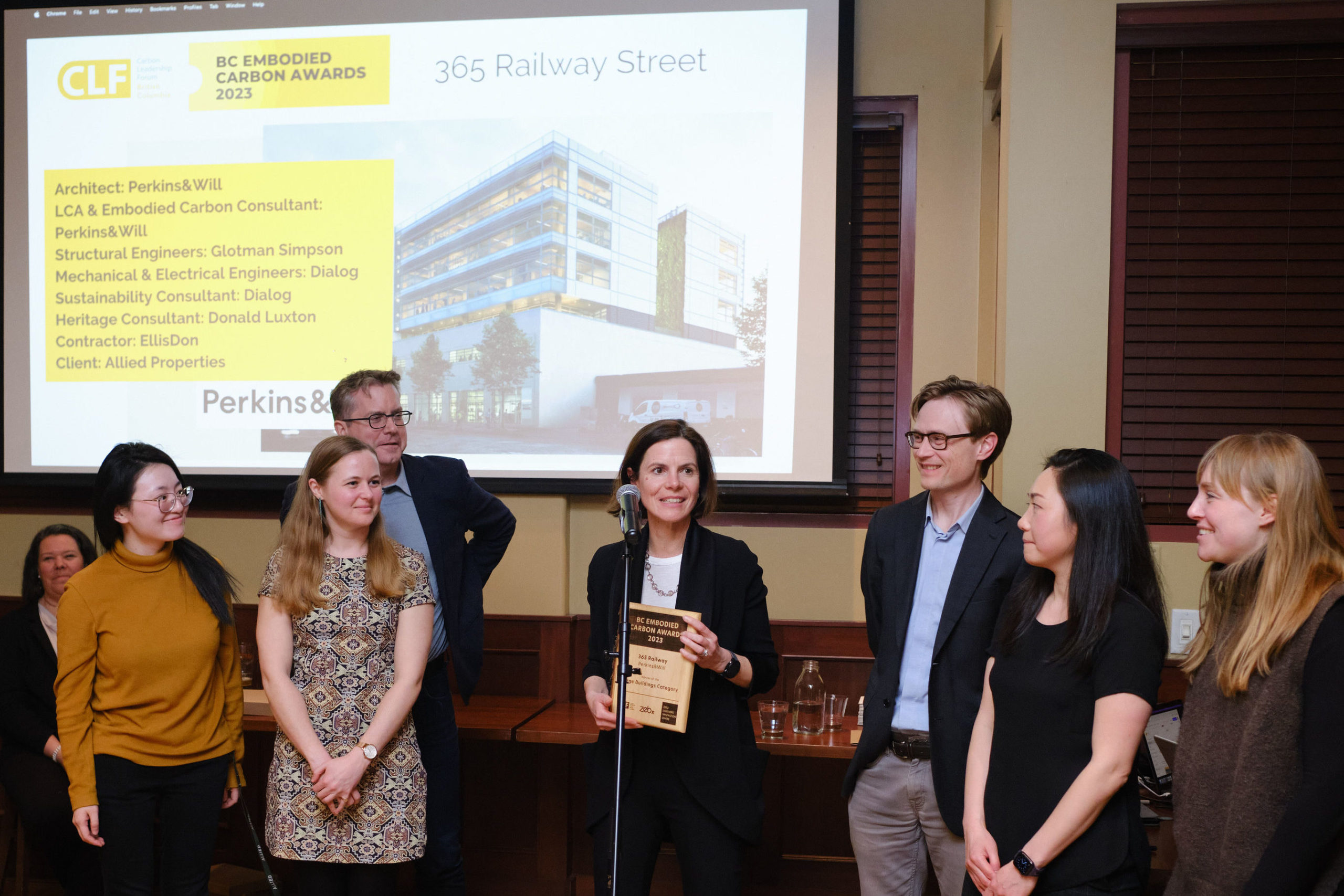
Graphics – Winning Projects




Further Background
Metro Vancouver Zero Emissions Innovation Centre (ZEIC) website
Zero Emissions Building Exchange (ZEBx) website

